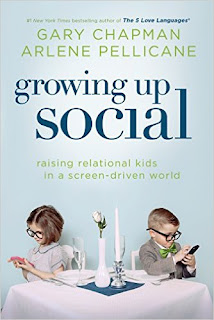Book Review: Growing Up Social: Raising Relational Kids in a Screen Driven World
Title: Growing Up Social: Raising Relational Kids in a Screen-Driven World by Gary Chapman & Arlene Pellicane
Publisher: Northfield Publishing
Format: E-book
Pages: 241 pages
Genre: Parenting/ Christian
Synopsis: In this digital age, children are spending more and more time interacting with a screen rather than a parent. Technology has the potential to add value to our families, but it can also erode a sense of togetherness and hinder a child's emotional growth. In Growing Up Social: Raising Relational Kids in a Screen-Driven World, you'll learn how to take back your home from an over-dependence on screens. Discover the five A+ skills needed to give your child the relational edge in a screen-driven world: affection, appreciation, anger management, apology, and attention. Today's screens aren't just in our living rooms; they are in our pockets. Now is the time to equip your child to live with screen time, not for screen time. Constant entertainment is not the goal of childhood. No phone, tablet, or gaming device can teach your child how to have healthy relationships; only you can.Growing Up Social will help you:
This statistic is alarming to me because it also coincides with research that shows that "before mobile phones and computer apps were popular, the average person's attention span was 12 seconds. Since then, our attention span has dropped by 40 percent." Read that line again, our attention spans have dropped by 40%!!! That's crazy. And we wonder why the rate of ADHD is increasing in children.
By setting limits on electronics and teaching our children to interact in the real world instead of just the virtual world we will actually raise more empathetic, social children with decreased anxiety and depression. Social interaction in the real world has been shown to decrease feelings of isolation and depression but so many children are relying on virtual interaction and are losing the skills of being able to relate to people in the real world.
Limiting children's screen time isn't enough though we also have to limit our own since we as adults need to practice what we preach and lead by example. This book shows different ways we can encourage our children to limit their screen time and how to be consistent. What they find is that when we as parents put down our phones and tablets and interact with our children we not only have increased patience we have better relationships with them as they grow. Imagine how much we miss while staring at our screens.
I freely admit I am addicted to my phone and feel lost if I forget it and will actually go back for it...it takes a concious effort on my part to keep my phone in my bag during dinners out etc...and I didn't grow up with this technology, imagine if this was the world we grew up in? It would be normal, I actually pity so many of today's children for not playing outside, riding bikes and wading through creeks. This interaction with our world is so important to our well being - getting our hands dirty, making mud pies, using our imaginations, instead of blankly staring and being entertained. Playdates shouldn't consist of ipads, they should consist of making forts and baking cookies, playing tag, or visiting museums and parks.
The authors have great ideas for how to talk to kids about technology and how to not get mad at them or "punish" them for using it but setting limits and talking about how it affects us as people. This book IS NOT anti-technology its about using technology wisely.
This book is filled with some great ideas and some wake up calls to help our future generations. Me and the authors may not agree on religion but we agree that we are harming our children with all of this technology and putting them at a disadvantage in the world instead of what tech companies are trying to push us to believe. You don't need tech to learn you just need someone to teach you.
Publisher: Northfield Publishing
Format: E-book
Pages: 241 pages
Genre: Parenting/ Christian
Synopsis: In this digital age, children are spending more and more time interacting with a screen rather than a parent. Technology has the potential to add value to our families, but it can also erode a sense of togetherness and hinder a child's emotional growth. In Growing Up Social: Raising Relational Kids in a Screen-Driven World, you'll learn how to take back your home from an over-dependence on screens. Discover the five A+ skills needed to give your child the relational edge in a screen-driven world: affection, appreciation, anger management, apology, and attention. Today's screens aren't just in our living rooms; they are in our pockets. Now is the time to equip your child to live with screen time, not for screen time. Constant entertainment is not the goal of childhood. No phone, tablet, or gaming device can teach your child how to have healthy relationships; only you can.Growing Up Social will help you:
- Equip your child to be relational rich in a digital world
- Replace mindless screen time with meaningful family time
- Establish simple boundaries that make a huge difference
- Read what's working for the screen savvy family down the street
- Prepare your child to succeed down the road in relationships and life
- Learn healthy ways to occupy your child while you get things done
This statistic is alarming to me because it also coincides with research that shows that "before mobile phones and computer apps were popular, the average person's attention span was 12 seconds. Since then, our attention span has dropped by 40 percent." Read that line again, our attention spans have dropped by 40%!!! That's crazy. And we wonder why the rate of ADHD is increasing in children.
By setting limits on electronics and teaching our children to interact in the real world instead of just the virtual world we will actually raise more empathetic, social children with decreased anxiety and depression. Social interaction in the real world has been shown to decrease feelings of isolation and depression but so many children are relying on virtual interaction and are losing the skills of being able to relate to people in the real world.
Limiting children's screen time isn't enough though we also have to limit our own since we as adults need to practice what we preach and lead by example. This book shows different ways we can encourage our children to limit their screen time and how to be consistent. What they find is that when we as parents put down our phones and tablets and interact with our children we not only have increased patience we have better relationships with them as they grow. Imagine how much we miss while staring at our screens.
I freely admit I am addicted to my phone and feel lost if I forget it and will actually go back for it...it takes a concious effort on my part to keep my phone in my bag during dinners out etc...and I didn't grow up with this technology, imagine if this was the world we grew up in? It would be normal, I actually pity so many of today's children for not playing outside, riding bikes and wading through creeks. This interaction with our world is so important to our well being - getting our hands dirty, making mud pies, using our imaginations, instead of blankly staring and being entertained. Playdates shouldn't consist of ipads, they should consist of making forts and baking cookies, playing tag, or visiting museums and parks.
The authors have great ideas for how to talk to kids about technology and how to not get mad at them or "punish" them for using it but setting limits and talking about how it affects us as people. This book IS NOT anti-technology its about using technology wisely.
This book is filled with some great ideas and some wake up calls to help our future generations. Me and the authors may not agree on religion but we agree that we are harming our children with all of this technology and putting them at a disadvantage in the world instead of what tech companies are trying to push us to believe. You don't need tech to learn you just need someone to teach you.




Comments
Post a Comment